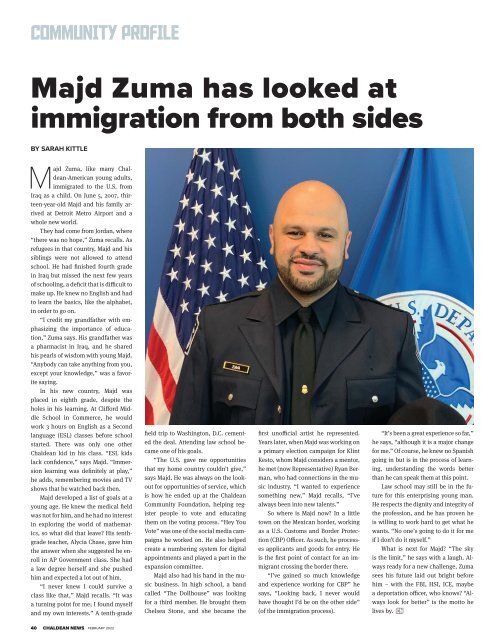You also want an ePaper? Increase the reach of your titles
YUMPU automatically turns print PDFs into web optimized ePapers that Google loves.
COMMUNITY PROFILE<br />
Majd Zuma has looked at<br />
immigration from both sides<br />
BY SARAH KITTLE<br />
Majd Zuma, like many Chaldean-American<br />
young adults,<br />
immigrated to the U.S. from<br />
Iraq as a child. On June 5, 2007, thirteen-year-old<br />
Majd and his family arrived<br />
at Detroit Metro Airport and a<br />
whole new world.<br />
They had come from Jordan, where<br />
“there was no hope,” Zuma recalls. As<br />
refugees in that country, Majd and his<br />
siblings were not allowed to attend<br />
school. He had finished fourth grade<br />
in Iraq but missed the next few years<br />
of schooling, a deficit that is difficult to<br />
make up. He knew no English and had<br />
to learn the basics, like the alphabet,<br />
in order to go on.<br />
“I credit my grandfather with emphasizing<br />
the importance of education,”<br />
Zuma says. His grandfather was<br />
a pharmacist in Iraq, and he shared<br />
his pearls of wisdom with young Majd.<br />
“Anybody can take anything from you,<br />
except your knowledge,” was a favorite<br />
saying.<br />
In his new country, Majd was<br />
placed in eighth grade, despite the<br />
holes in his learning. At Clifford Middle<br />
School in Commerce, he would<br />
work 3 hours on English as a Second<br />
language (ESL) classes before school<br />
started. There was only one other<br />
Chaldean kid in his class. “ESL kids<br />
lack confidence,” says Majd. “Immersion<br />
learning was definitely at play,”<br />
he adds, remembering movies and TV<br />
shows that he watched back then.<br />
Majd developed a list of goals at a<br />
young age. He knew the medical field<br />
was not for him, and he had no interest<br />
in exploring the world of mathematics,<br />
so what did that leave? His tenthgrade<br />
teacher, Alycia Chase, gave him<br />
the answer when she suggested he enroll<br />
in AP Government class. She had<br />
a law degree herself and she pushed<br />
him and expected a lot out of him.<br />
“I never knew I could survive a<br />
class like that,” Majd recalls. “It was<br />
a turning point for me; I found myself<br />
and my own interests.” A tenth-grade<br />
field trip to Washington, D.C. cemented<br />
the deal. Attending law school became<br />
one of his goals.<br />
“The U.S. gave me opportunities<br />
that my home country couldn’t give,”<br />
says Majd. He was always on the lookout<br />
for opportunities of service, which<br />
is how he ended up at the Chaldean<br />
Community Foundation, helping register<br />
people to vote and educating<br />
them on the voting process. “Hey You<br />
Vote” was one of the social media campaigns<br />
he worked on. He also helped<br />
create a numbering system for digital<br />
appointments and played a part in the<br />
expansion committee.<br />
Majd also had his hand in the music<br />
business. In high school, a band<br />
called “The Dollhouse” was looking<br />
for a third member. He brought them<br />
Chelsea Stone, and she became the<br />
first unofficial artist he represented.<br />
Years later, when Majd was working on<br />
a primary election campaign for Klint<br />
Kesto, whom Majd considers a mentor,<br />
he met (now Representative) Ryan Berman,<br />
who had connections in the music<br />
industry. “I wanted to experience<br />
something new,” Majd recalls, “I’ve<br />
always been into new talents.”<br />
So where is Majd now? In a little<br />
town on the Mexican border, working<br />
as a U.S. Customs and Border Protection<br />
(CBP) Officer. As such, he processes<br />
applicants and goods for entry. He<br />
is the first point of contact for an immigrant<br />
crossing the border there.<br />
“I’ve gained so much knowledge<br />
and experience working for CBP” he<br />
says, “Looking back, I never would<br />
have thought I’d be on the other side”<br />
(of the immigration process).<br />
“It’s been a great experience so far,”<br />
he says, “although it is a major change<br />
for me.” Of course, he knew no Spanish<br />
going in but is in the process of learning,<br />
understanding the words better<br />
than he can speak them at this point.<br />
Law school may still be in the future<br />
for this enterprising young man.<br />
He respects the dignity and integrity of<br />
the profession, and he has proven he<br />
is willing to work hard to get what he<br />
wants. “No one’s going to do it for me<br />
if I don’t do it myself.”<br />
What is next for Majd? “The sky<br />
is the limit,” he says with a laugh. Always<br />
ready for a new challenge, Zuma<br />
sees his future laid out bright before<br />
him – with the FBI, HSI, ICE, maybe<br />
a deportation officer, who knows? “Always<br />
look for better” is the motto he<br />
lives by.<br />
40 CHALDEAN NEWS <strong>FEBRUARY</strong> <strong>2022</strong>

















